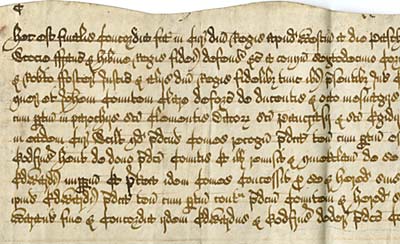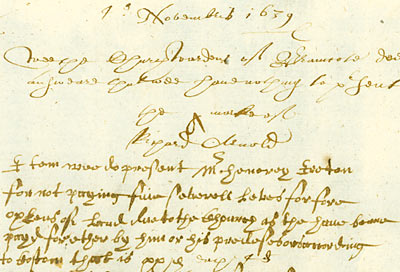What to expect from archives
First time users of archives may find difficulties and challenges in using some documents.

Final concord, written in Latin, 1640 (Ne D 32)
Some documents may require language skills. Most official documents were written in Latin up to 1733. Diplomatic papers or correspondence may be written in European foreign languages. Even documents written in older styles of English can be quite hard to understand!
An excellent Beginners' Latin online tutorial is available on the website of The National Archives.

Presentment Bill, written in English, 1639 (AN/PB 303/679)
The technique of reading old handwriting is called palaeography and is an important skill for researchers. There are several high-quality web sites providing skills in palaeography and 'diplomatic' (the physical make-up and structure of the information found in old documents). Users may find the following useful:
Vocabulary and specialist skills
Archives were written using the conventions of the time. You might find:
- Words which are no longer in common use
- Old weights and measures such as bushels, firkins and roods
- Old currency (£, s, d)
- Dialect terms
- Abbreviations
- Archaic methods of accounting
- 'Old Style' dating (until 1752 the civil year began on 25th March)
Most archive offices have a number of reference works and information leaflets available for users of archives to consult, to assist them in their research.
Manuscripts and Special Collections has developed a series of Research Guidance resources. This present unit on Using Archives is one of the Resources. You can see the others in the navigation bar on the left hand side of this page. Other units give advice on how to determine the date of documents, how to interpret old weights, measures and money, and how to use maps and plans, deeds, and manorial records.
Research techniques
- Be methodical. Always keep clear notes of the reference numbers of documents you have consulted. Include items which had nothing of interest in them - you won't want to look at them twice!
- You may have to prioritise your research if you only have limited time available. Ask staff which items can be photocopied for you to work on at home, and concentrate on those which can't
- Archives were created for a specific purpose at the time - they were not written with future researchers in mind. As a result, it can be time-consuming to find and extract the information you want. An understanding of the historical context behind the creation of the documents can help
- Take the time to look at a complicated document in its entirety - does it have its own index, or a list of contents? Can you work out how it was meant to be used? Many pieces of valuable information are 'hidden' and can be challenging to find. However, the process of discovery can be very satisfying. The more time you spend with archives, they easier they are to use.
Next page: Glossary